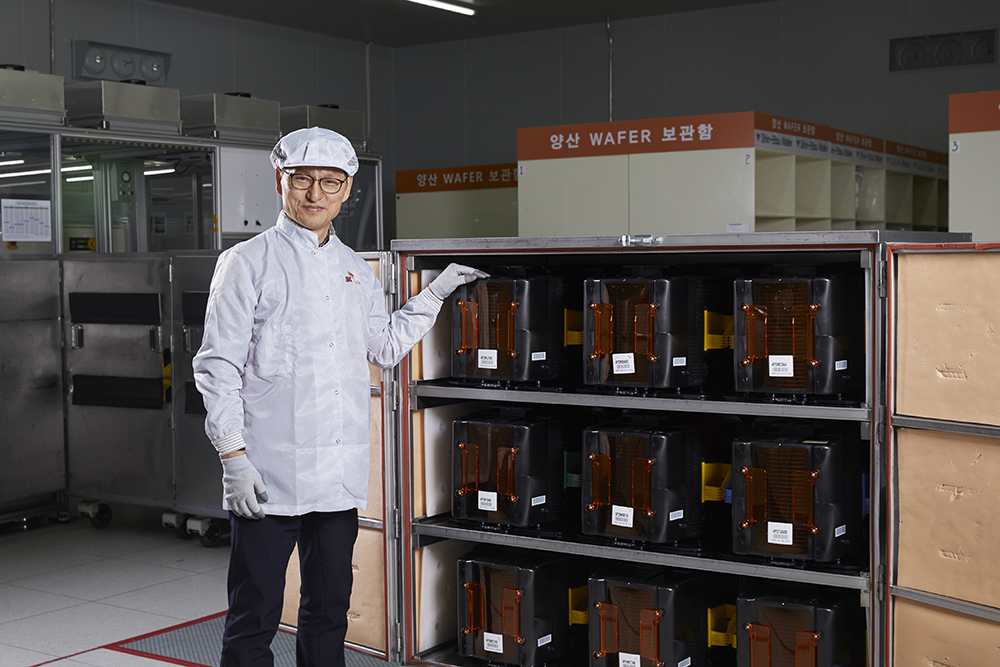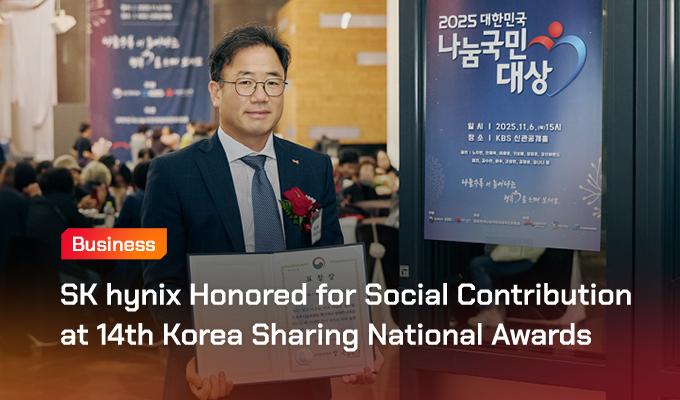Two years have passed since the SK Group initiated its “Double Bottom Line” (DBL) management by declaring the “New SK.” In SK hynix, members are engaging in incredible voluntary activities to put this DBL approach into practice. Among them, the group showing the most remarkable commitment toward creating social values (SV) is our Icheon FAB DBL Implementation Group. The SK hynix newsroom team met with Technical Leader (TL) Yeon Wook Cho, a member of Icheon FAB DBL Implementation Group who won the Grand Prize at SV Pursuit Practice Competition last year with his innovation – “Constant Temperature Technology for FAB-to-FAB Logistics,” to learn more about his ideas and successes.

An Inspiring Hint from Ice Packs to Solve Temperature-Sensitive Wafer Problem
As a fundamental material for semiconductor manufacturing, wafers go through hundreds of processes until complete chips are fabricated. During this process, wafers are transported from one FAB, a fabrication plant, to another, and sometimes even to FABs in other cities or countries, like SK hynix’s Wuxi FAB in China. Cho, who works at Icheon Fabrication Consolidation Team of SK hynix is responsible for the logistics of such wafer transportations. In the field, he has always pondered hard to find the best ways to transfer wafers intact.

“Wafers are kept inside boxes called Front Opening Unified Pod (FOUP), and then transported in FOUP carts or FOUP bags for domestic logistics. However, these wafers are very sensitive to temperature. When temperatures inside and outside of FOUPs differ, condensation problems occur. Simply speaking, when dew formed on the wafer evaporates, it leaves marks on the surface causing damage, which then leads to quality issues.”
In particular, the logistics cost overseas transportation was huge due to wafers’ temperature sensitiveness. Containers capable of maintaining constant temperatures were necessary for wafers, but they cost an enormous amount of money, an average of KRW 10 billion (USD 8 million) per year. To solve the risks to quality that arise from external temperature changes, the internal elements of the means of transportation, such as carts, bags, and containers, had to be improved. At this point, one thing that came up in Cho’s mind was the “ice packs” used to fill iceboxes.

“At first, I was so frustrated and I just tried putting an ice pack in the FOUP cart, but it was impossible to set the temperature needed to perfectly preserve our wafers. While looking for materials that would work well with wafers, I learnt of “Phase Change Material (PCM).” PCM turns solid or liquid based on changes of external temperatures. For this feature PCM absorbs and release heat continuously helping maintain a certain level of temperature. I thought it would be great to have PCM standardized like an ice pack and attach it inside the wafer transportation means.”
The Very First Case of Applying PCM to Semiconductor Logistics
The “Constant Temperature Technology for FAB-to-FAB Logistics” is the very first case of applying PCM to semiconductor logistics. It was a simple idea, but an unexplored one. Cho started collaborating with his colleagues in the Global Logistics Team who had been devising a similar solution. Also, he began to jointly develop this technology with a partner company called FMS Korea Co., Ltd., which had the PCM-related source technology.

“The key was to set PCMs to respond to the temperature range (20℃ to 26℃) that would maintain the quality of wafers at the proper level. Specifically, we had to carefully decide the form and amount of PCMs being attached to each cart or bag. It was the most difficult process to test our solution to ensure that it meets the actual logistics environment while delivering optimal performance.”
“The key was to set PCMs to respond to the temperature range (20℃ to 26℃) that would maintain the quality of wafers at the proper level. Specifically, we had to carefully decide the form and amount of PCMs being attached to each cart or bag. It was the most difficult process to test our solution to ensure that it meets the actual logistics environment while delivering optimal performance.”
Enhancing Partners Companies’ Competitiveness via Joint Development
As one of the close partners of SK hynix, FMS Korea filed a patent application for the products adopting its constant temperature logistics technology, and is further creating new business models in other industries such as food, medicine, and distribution industry. As a result, SK hynix contributed to 10% (approx. KRW 1.5 billion, USD 1 million) sales revenue of the partner company, achieving both the social value and economic value simultaneously.

“I never imagined the small idea that I came up with to solve the problems in the field could have such a huge ripple effect. I’ve learnt that, no matter how simple the idea is, if we develop it by collaborating with each other, we can create values beyond our imagination.”
Cho, who learned the real value of DBL by leading the joint development with FMS Korea, does not intend to stop here. He is still thinking up new ways to create and inspire both economic and social value, as a member of Icheon FAB DBL Implementation Group. Cho said, “To standardize work methods and maximize efficiency for logistics in Icheon FAB, we formed a SV Promotion Consultative Group for sharing ideas through weekly meetings.” About the future plan, he commented, “Based on this joint development case, we will continue to contemplate and devote ourselves to pursuing DBL.”








